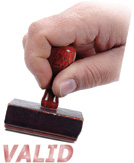Web Site Credibility
 Students at all grade levels need to be forced to evaluate Web site credibility for the sources they use. What is taught or required of elementary school students and what we expect from graduate students is clearly very different. But it seems to me that too many teachers at all the higher levels (high school and above) make dangerous assumptions that students "should have learned how to do that" at the preceding level.
Students at all grade levels need to be forced to evaluate Web site credibility for the sources they use. What is taught or required of elementary school students and what we expect from graduate students is clearly very different. But it seems to me that too many teachers at all the higher levels (high school and above) make dangerous assumptions that students "should have learned how to do that" at the preceding level.There are many online resources to use, but most require students to consider questions of credibility. Here are a few typical questions students need to be taught to ask when using a site as a source.
1. Who is the author(s)? What are their credentials?
2. Note the site domain (such as .com, .org or .edu) which may provide useful information. While .ac and .edu sites are regulated educational sites, that doesn't validate everything found there. For example, my own web space at NJIT http://web.njit.edu/~ronkowit/ contains my own content. That tilde ~ indicates that this is not part of the main njit.edu site. The domains .com and .biz sites are for commercial purposes and .gov sites are U.S. government sites. Is information credible because it is on a government site? Is information biased if it is on a commercial site? There is no standard answer and students need to be able to distinguish the differences. Other URL endings indicate the country of origin of the site and some are sponsored and regulated (for example, .jobs, .museum and .travel)
3. Especially when there is no "author" available by name, who is making the information available?
4. How is the site being funded? Are they trying to sell you something?
5. Does the site appear to have any social or political biases? You might find clues in an "About Us” section but you probably need to dig deeper to get an unbiased view about their bias.
6. When was the information first published? Has it been updated recently? Some pages indicate when they were created/revised but finding the equivalent of a copyright date isn't as easy as with a print publication.
Comments
No comments